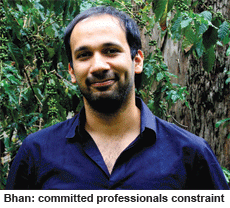A heavy and onerous responsibility of drawing up detailed blueprints for the construction of new towns and cities has devolved upon professionally qualified urban planners
With India’s urban population slated to increase from 350 million currently to 580 million by 2030, and the number of urban house-holds predicted to rise from 22 million to 91 million in 20 years, urban planning has emerged as a vitally important vocation. Professional urban planners have the onerous responsibility of drawing up detailed blueprints for construction of new cities and towns, and devise optimal land use strategies to accommodate the influx of rural migrants into India’s already crowded towns and cities.
The minimum academic qualification required for acceptability into this esoteric profession (only 5 percent of the country’s top 21,000 civic management professionals are formally trained) is a Masters degree in urban or regional planning from an institute accredited by the Planning Accreditation Board, Delhi. For admission into a Masters programme of an accredited insti-tution, a bachelor’s degree in archi-tecture/urban design/economics/or environmental design is the usual requirement. Formal study programmes in urban planning are normatively offered by architecture, design, geography and/or public policy schools.
The School of Planning and Architecture, Delhi (estb. 1959) is widely acknowledged as the country’s premier institute for town/urban planning studies, offering undergrad, postgrad and doctoral programmes. Another well-reputed institute is the Centre for Environmental Planning & Technology, Ahmedabad.
For working professionals already employed in urban planning and development in civic and municipal organisations, the Bangalore-based Indian Institute for Human Settlements (IIHS) offers an 11-month full-time Programme for Working Professionals in Urban Development (PWP-UD). Graduates with at least three years’ work experience and postgraduates in any discipline with two years’ work experience are eligible for admission into IIHS. Promoted in 2008 as a PPP (public-private partnership) education instit-ution, IIHS is India’s first prospective independently funded and managed inter-disciplinary national university for research and innovation. Its objective is to research civic management issues.
 Employment and career development prospects are excellent both in public and private organisations. In the public sector, certified urban planning prof-essionals are urgently required in municipal corporations, local govern-ments and parastatal organisations. They are also needed in civil society organisations engaged with livelihood, advocacy and civil rights, improved urban services delivery, community empowerment and social inclusion issues. In the private sector, certified urban planning professionals find ready employment in infrastructure develop-ment, real estate, construction and consultancy companies. Given the acute shortage of qualified urban/civic plan-ners, this is a well-paid profession. Freshers can expect Rs.25,000 per month as a start with pay packages swelling to Rs.100,000 depending on performance and experience.
Employment and career development prospects are excellent both in public and private organisations. In the public sector, certified urban planning prof-essionals are urgently required in municipal corporations, local govern-ments and parastatal organisations. They are also needed in civil society organisations engaged with livelihood, advocacy and civil rights, improved urban services delivery, community empowerment and social inclusion issues. In the private sector, certified urban planning professionals find ready employment in infrastructure develop-ment, real estate, construction and consultancy companies. Given the acute shortage of qualified urban/civic plan-ners, this is a well-paid profession. Freshers can expect Rs.25,000 per month as a start with pay packages swelling to Rs.100,000 depending on performance and experience.
“There is critical need for a radical shift in urban planning policy formulation and practices to build healthy and hospitable cities of the future. This calls for a new generation of implementers, managers, advocates, activists, game-changers, leaders and urban planning practitioners. The greatest constraint of contemporary India is the availability of a sufficient number of well-educated professionals committed to the common good to discharge these roles,” laments Dr. Gautam Bhan, senior consultant for curriculum development and policy, and advisory services at IIHS.
An eminently qualified alumnus of Amherst College, USA, University of Chicago (Masters in urban studies and planning), University of California, Berkeley and Harvard University (doct-orate), Dr. Bhan researched urban planning issues in the Society for Applied Studies, New Delhi prior to signing up with IIHS in 2009. Currently he is widely regarded as an authority on the politics of poverty and issues relating to eviction and resettlement of rural migrants in urban India.
Associated with the development of IIHS’ globally unique PWP-UD for over four years, Dr. Bhan especially recommends this 11-month programme for the vast number of managers and civic professionals employed by muni-cipal corporations and town councils countrywide. “This is a thorough, full-time, interdiscipl-inary programme designed for working professionals in urban planning and development. The programme covers key concepts, tools, trends and debates which are the basic building blocks of urban planning practice. It prepares participants to become creative urban development professionals,” he says fervently.
Unlike the great majority of academics and media pundits who despair about 21st century India’s chaotic, misgoverned and exploding cities, Dr. Bhan believes order will be restored by the initiatives of the country’s academic institutions including IIHS which has set itself the target of training and skilling over 100,000 urban planning graduates and multiple mid-career professionals during the next decade. “India has the tradition and capability to build world-class cities,’’ says Dr. Bhan optimis-tically.
God Speed!
Indra Gidwani (Mumbai)